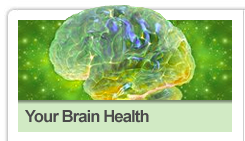 At least that is the conclusion from a review of the current state of research described on the Beautiful Minds website. The site is a educational effort by the National Center for Creative Aging and Martek Biosciences Corporation. They define brain health in terms of four dimensions:
At least that is the conclusion from a review of the current state of research described on the Beautiful Minds website. The site is a educational effort by the National Center for Creative Aging and Martek Biosciences Corporation. They define brain health in terms of four dimensions:
- The nourished mind
- The mentally engaged mind
- The socially connect mind
- The physically active mind
They have a quiz you can take to see where you stand and have even developed a brain health index for all 51 states.
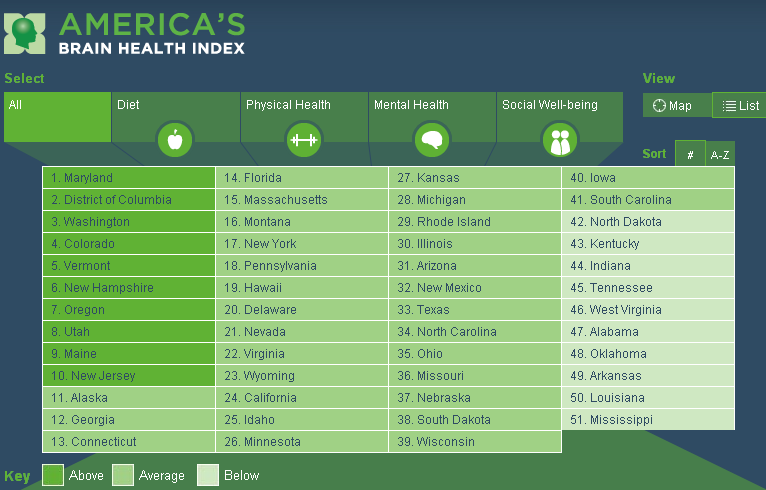
As you can see Maryland is ranked #1 and Mississippi is ranked last. When you go to the site you can click on each state and get more details including an analysis of strengths and weaknesses.
All the tips they offer have been covered elsewhere on the Next Brain blog but it is useful to review them. The site also offers inspirational stories, a beautiful mind contest and resources for the healthcare professional. Check it out and let me know what is most useful.
 Researchers at Andrews University have found a potential connection between eating walnuts and improved critical reasoning skills in young adults. They published their findings in the British Journal of Nutrition. The bottom line:
Researchers at Andrews University have found a potential connection between eating walnuts and improved critical reasoning skills in young adults. They published their findings in the British Journal of Nutrition. The bottom line:
“Students consuming walnuts showed a significant improvement in inference after consuming one-half cup of walnuts daily for eight weeks,” says Pribis. “Walnuts will obviously not make you a critical thinker; this comes after years of studying. However, students and young professionals in fields that involve a great deal of critical thinking or decision-making could benefit from regularly eating walnuts.”
Significant improvement in this case means scoring 11% higher on a verbal inferential reasoning task. Walnuts were ground up and consumed by having two sliced of banana bread every day.
We have reported on additional claims that walnuts provide a cognitive boost elsewhere on the Next Brain blog
I am interested to hear from readers that use walnuts to improve brain function or cognitive performance. How many do you eat and how often? How do you consume them – raw or as an ingredient in some other food?

Many of the emails I get about building a Next Brain have to do with drugs, especially medication prescribed for attention deficit hyperactivity disorder or ADHD. Readers want to know if there is evidence to support the claim that people without ADHD that still use drugs like Adderall will experience improved brain function and enhanced cognitive performance.
Important note: Using medications outside of the boundaries of their prescription or using medications without a prescription can be unsafe and illegal.
 The 2011 September issue of the Psychological Bulletin has taken this question up with articles on who takes so-called smart pills and what kind of effects they are having. My favorite paper,
The 2011 September issue of the Psychological Bulletin has taken this question up with articles on who takes so-called smart pills and what kind of effects they are having. My favorite paper,
Are Prescription Stimulants “Smart Pills”? The Epidemiology and Cognitive Neuroscience of Prescription Stimulant Use by Normal Healthy Individuals,
reviews results from over 40 studies finds:
“The cognitive effects of stimulants on normal healthy people cannot yet be characterized definitively, despite the volume of research that has been carried out on these issues. Published evidence suggests that declarative memory can be improved by stimulants, with some evidence consistent with enhanced consolidation of memories. Effects on the executive functions of working memory and cognitive control are less reliable but have been found for at least some individuals on some tasks.”
In short there is some evidence for improved learning by memorizing (simple list of items) but doubt about significant improvement on working memory (how much information you can attend to at one) or self control.
More research is in the works but early results signal that the smart pill in its current form is not a silver bullet for the Next Brain.
 Learning or relearning the basics of arithmetic – or how to add, subtract, multiply and divide numbers – is painful for most. With calculators everywhere some ask why even learn arithmetic?
Learning or relearning the basics of arithmetic – or how to add, subtract, multiply and divide numbers – is painful for most. With calculators everywhere some ask why even learn arithmetic?
Arithmetic is a core skill in a broader competency called numeracy or how we think quantitatively or with numbers. Quantitative literacy is important for success in a wide variety of careers and household projects, even if you use a calculator! Turns out that learning arithmetic (when done right) is excellent brain training and a foundation for quantitative literacy.
One key – see patterns in numbers using simple rules.
For example, can you complete 98 x 97 = ? in five seconds without a calculator? How about without paper and pencil?
This YouTube video will teach you how to do the problem and similar ones in just a few minutes. A snapshot is given below.

This is just one example of how a simple rule will immediately boost you math skills and build your brain. Of course you need to practice to get it to stick. There are many such rules and even some math programs for sale that teach them. The video above comes from Glad2Teach that also offers a similar approach to algebra. Another program that combines simple rules with memory building and fun is Brainetics.
Even if you already know arithmetic, such programs offer 10-15 minute daily exercises for training your math brain and building quantitative competency.
Very interested to hear from readers with experience using programs that teach simple rules for doing complex arithmetic problems by looking for patterns in numbers.
 Competitive scrabble players are able to recognize words 20% faster than non scrabble players according to new research from the University of Calgary. More importantly, they found it enhances the cognition you use to recognize words:
Competitive scrabble players are able to recognize words 20% faster than non scrabble players according to new research from the University of Calgary. More importantly, they found it enhances the cognition you use to recognize words:
“The average literate adult relies on three components to process and read a word: sound, spelling and meaning,” says Penny Pexman, professor of Psychology. “When we studied the Scrabble players, we found that there is significant flexibility in the tools they use to read words and that it can include the orientation of the word as well.”
Playing games is one well-known strategy for improving brain function and cognitive performance. Many posts on the Next Brain Blog cover the topic. Trouble is skills developed by game playing are often margin improvements and don’t transfer into new domains. That makes the finding about play Scrabble significant – 20% improvement and it transfers!
I am interested to hear from readers that are getting significant and transferable brain boosts from other games.
 A group of researchers in Finland have demonstrated that our brain is photosensitive. Brain function changes when you shine light on it. Their research has shown that brain light therapy can improve cognitive function, mental energy and mood. The effects seem significant and long lasting.
A group of researchers in Finland have demonstrated that our brain is photosensitive. Brain function changes when you shine light on it. Their research has shown that brain light therapy can improve cognitive function, mental energy and mood. The effects seem significant and long lasting.
You can shine light directly on some of the photosensitive regions of your brain through the ear canal. A consumer product, Valkee, does exactly that with light-emitting ear plugs. According to the researchers you need to use it for 10 minutes a day to see results.
Interested to hear from readers that have used the Valkee or some other form of light-based brain stimulation.
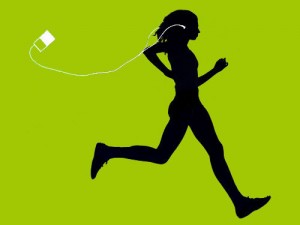 In the Next Brain blog we review techniques that hold good promise for improving brain function and cognitive performance. Many of the techniques involve lifestyle choices, for example how you eat, sleep, interact with others and exercise; others involve major development efforts such as learning to play a musical instrument, second language or how to reason critically; still others are specialized, for example neuro-feedback, brain training, mindfulness and yoga. One concern I often hear is that many techniques produce small or temporary effects. This is true. One way to combat that is to combine them for greater effect.
In the Next Brain blog we review techniques that hold good promise for improving brain function and cognitive performance. Many of the techniques involve lifestyle choices, for example how you eat, sleep, interact with others and exercise; others involve major development efforts such as learning to play a musical instrument, second language or how to reason critically; still others are specialized, for example neuro-feedback, brain training, mindfulness and yoga. One concern I often hear is that many techniques produce small or temporary effects. This is true. One way to combat that is to combine them for greater effect.
For example, researchers at Ohio State University studied the impact of combing aerobic exercise and music, two well-known brain boosters, to find:
“The improvement in verbal fluency test performance after listening to music was more than double that of the non-music condition.”
Listening to music while you workout will significantly improve your score on a standardized cognitive test. Subjects in the study that listened to the music also reported feeling better and a more positive mood.
I am looking for additional research on combination effects. If you have a reference or personal story you would like to share please reply to this blog post.
The listening and sound expert Julian Treasure has an excellent 8 minute TED Talk video on why we are losing our ability to listen and what to do about it. Of special interest to readers of the Next Brain Blog are the five techniques he offers to improve your ability to listen consciously. These include:
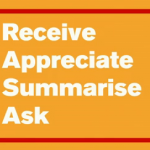 Actively listen to others by practicing RASA or receive, appreciate, summarize and ask questions.
Actively listen to others by practicing RASA or receive, appreciate, summarize and ask questions.- Enjoy 3 minutes of silence or quiet per day to help reset or re-calibrate your listening.
- Count the channels or sources of sound in a noisy environment. For example, walking down a city street you receive sound from a dozen sources including car horns, nearby conversation, buses and so on.
- Change your listen position by adjusting the filters that shape how you hear including for example, expectations and empathy.
- Listen to the hidden choir around you. This involves savoring ordinary sounds, for example hearing the symphony in your tumble dryer.
These five techniques are simple but practicing them will with time transform how you consciously listen. Hearing the world is a key to improved cognitive performance.
Interested to hear from readers that practice specific techniques of conscious listening. What techniques do you use? What have you heard that the rest of have not?
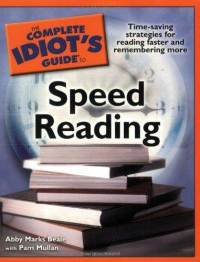 I read faster from paper than I do on a computer screen. With paper I can use my finger to guide my eyes. A well-known speed reading technique, guiding and pacing, lowers the load on your visual system and helps avoid skipping back and other distractions. It is simple and it works. Try it out.
I read faster from paper than I do on a computer screen. With paper I can use my finger to guide my eyes. A well-known speed reading technique, guiding and pacing, lowers the load on your visual system and helps avoid skipping back and other distractions. It is simple and it works. Try it out.
With practice you can drop your finger and still get the effect because your eyes have been retrained. I get some of this effect but am still fastest with good comprehension when I use my finger.
This is just one of the techniques covered in the excellent book, The Complete Idiot’s Guide to Speed Reading.
If you don’t already use these techniques, several weeks of practice will produce a big jump in you reading speed and will likely improve comprehension as well.
Reading speed is important. The difference between a slow reader and an excellent reader means 3 books per week if you read an hour a day.
Very interested to hear from readers that have simple techniques (e.g. use of your finger) to crank your reading speed or other cognitive performances.
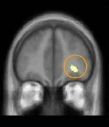 Mediation and mindfulness training is a frequent topic on the Next Brain Blog. Over the last several years we have seen studies that show a few weeks of meditation can produce measurable improvement in cognitive function and long-term practice actually makes certain brain regions larger. Now researchers at UCLA report in, Is Meditation the Push-Up for The Brain?:
Mediation and mindfulness training is a frequent topic on the Next Brain Blog. Over the last several years we have seen studies that show a few weeks of meditation can produce measurable improvement in cognitive function and long-term practice actually makes certain brain regions larger. Now researchers at UCLA report in, Is Meditation the Push-Up for The Brain?:
“… that people who meditate also have stronger connections between brain regions and show less age-related brain atrophy. Having stronger connections influences the ability to rapidly relay electrical signals in the brain. And significantly, these effects are evident throughout the entire brain, not just in specific areas.”
Changing the physical structure of the brain to preserve and enhance function and cognitive performance makes meditation a high-value training technique.
Interested to hear from readers that use any form of meditation. What technique do you use? How long have your practice? What Next Brain benefits do you see?
 At least that is the conclusion from a review of the current state of research described on the Beautiful Minds website. The site is a educational effort by the National Center for Creative Aging and Martek Biosciences Corporation. They define brain health in terms of four dimensions:
At least that is the conclusion from a review of the current state of research described on the Beautiful Minds website. The site is a educational effort by the National Center for Creative Aging and Martek Biosciences Corporation. They define brain health in terms of four dimensions:











